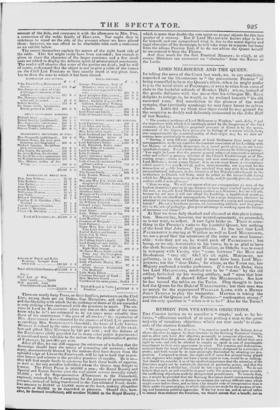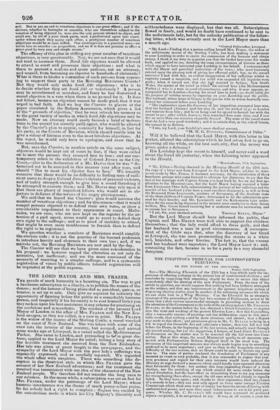REMEDY FOR VEXATIOUS OBJECTIONS.
THE Courier invites us to consider a " simple," and, ac ha be- lieves, "efficacious method of at once putting a stop to the great majority of vexatious objections which are now made" to claim- ants of the elective franchise.
" We ropose," says the Courier, " to repeal sa much of the Reform Act as allows objectors to appear by their attornies in the Revising Barristers' Courts, and to allow only Gana fide objectors personally to prosecute objections. We also propose that the persons objected to shall be obliged to defend their own right to vote. and only be allowed to employ an agent in case of considerable impediment to their own appearance in court. The vexation and disfranchise- ment are both tire result of the ingenuity of attornies. sharpened by a certainty of profit ; and both would be at once amazingly diminished by adopting our pro- position. Compared to them, the slight evil of some few persons being placed in the registers who might not have a strict right to vote, would be as nothing. Nor should we consider it as of the smallest importance that the attention of the Barristers might not be technically directed to particular points, and that the law, for want of a skilful bar, should be left A- igue and doubtful. We do not believe that such an evil would be as great under the system we propose asunder the conflicting objections made by sharp-witted practitioners. To remedy that, ton, it might be provided that the Revising Barristers should communicate their decisions to one another, or discuss in common the various difficult cases which might come before them, and so form a far simpler code of interpretation than is likely under the present plan, in which objections are made for the purpose of vex. ing and harassing political opponents. If the law were lax, and so served rather to extend than contract the franchise, we should esteem that a benefit, not an
evil But to put an end to vexatious objections is our great object ; and if the electors, whether in boroughs or counties, who are themselves subject to the vexation of being objected to, were also the only persons allowed to object, and could not, by aid of a joint stock purse, send a.profeasional agent into court, under whose mask they annoy each other, a prodigious number of vexatious objections would be at once stifled. Our contemporary is a practical man—we invite him to consider cur proposition, and see if it does not promise to effect a great good by very easy and simple means."
The efficacy of this plan in stifling any great number of vexatious objections, is very questionable. Nay, we are not sure that it would
not tend to increase them. Bond jide objectors would be allowed
to attend in court and prosecute their objections : and what is there to prevent a zealous and acute partisan, not an attorney, and unpaid, from becoming an objector to hundreds of claimants ? What is there to hinder a committee of such persons from appear- ing to support their party in the Revising Barristers' Courts?
But they would only make bona fide objections : who is to to decide whether they act bond fide or vexatiously ? A person may be misinformed or mistaken, and fancy he has discovered a sound objection to a vote when there is no ground for it. It does not follow, because an objection cannot be made good, that it was urged in bad faith. And we beg the Courier to glance at the paper circulated by the Reform Association, which gives a list of the " grounds of objection," that he may refresh his memory as to the great variety of modes in which bond fide objections may be made. Now an attorney could easily furnish a brief of instruc- tions to the unpaid (or secretly paid) agent, who would be allowed by the Courier's plan to appear, nominally for himself, in fact for his party, in the Courts of Recision, which should enable him to give a colour of fairness even to the most frivolous objections. At the worst, he would only have to apologize, and avow that he was misinformed.
But, says the Courier, in another article on the same subject, objectors would be kept out of court by fear, if they were called on to meet the persons they annoyed face to face; and our con- temporary refers to the exhibition of Colonel JONES in the City Court,—also to the declaration of a Mr. DAvis that he was " de- termined not to be annoyed in this manner year after year, and should " like to meet his objector face to face." We humbly conceive that there would be 110 difficulty in finding men of suffi- cient nerve to despise Colonel JONES'S threats of personal violence, and of bodily strength enough to give him a sound thrashing it' be attempted to execute them ; and Mr. DAVIS may rely upon it that there are plenty of impudent fellows who would act as ob- jectors in defiance of the terrors of his angry physiognomy. We said that we feared the Courier's plan would increase the number of vexatious objections ; and for this reason—that it would compel persons objected to to defend their own votes, or show a considerable impediment to their appearance in court. Multi- tudes, we are sure, who are now kept on the register by the at- tention of a paid agent, never would go to court to defend their own right to the suffrage ; and as to proof of inability to attend, that might be even more troublesome to furnish than to defend the right to be registered. We question whether a conclave of Barristers would simplify the election code : it is not the practice of the learned profession to introduce brevity and clearness to their own loss ; and, if we mistake not, the Revising Barristers are now paid by the day. The Courier will see that we have given some consideration to his proposal : we however regard the alteration as not only di- minutive, but inefficient ; and are the more convinced of the necessity of resorting to a simpler suffrage, and to a systematic registration of voters by public officers (should registration still be requisite) at the public expense.



























 Previous page
Previous page